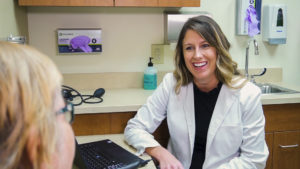Maternal care doesn’t end with birth; in many ways, it begins there. For women’s health providers, one area gaining more attention is postpartum care. This so-called “fourth trimester” is critical to the overall health of women and newborns.
For decades, postpartum care has often consisted of one encounter or visit about six weeks after delivery. But now, women’s health specialists — including the American College of Obstetricians and Gynecologists (ACOG) — are saying that a single patient encounter is simply not enough. In April 2018, ACOG released a statement and updated guidelines. “To optimize the health of women and infants,” the committee opinion reads, “postpartum care should become an ongoing process, rather than a single encounter, with services and support tailored to each woman’s individual needs.”
We spoke with two OBGYNs about the new ACOG opinion and how they’ve engaged in postpartum care.
The Value of “Fourth Trimester” Visits
“The black eye of obstetrics in America is that the maternal mortality rate has steadily dropped around the world over the last five decades, whereas in America it has continuously increased over the last decade,” says Mark Cone, MD, President of Privia Medical Group — Gulf Coast.
One way to help address the maternal mortality rate is with more emphasis and resources. Prenatal visits and postpartum care are essential, particularly when considering the value preventive care adds to the overall health of women.
“I’m delighted that ACOG went ahead and put an initiative on postpartum care because it’s really about setting the stage for long-term health,” says Kay Stout, MD, President of Virginia Women’s Center, a 50-provider practice in Richmond, VA.
Dr. Stout is addressing the need for postpartum care in her own practice is by establishing a clinical care coordinator role, a registered nurse with experience in obstetrics, who helps to close care gaps during the postpartum period.
“The clinical care coordinator calls the patient within two to three days of delivery to check in on their well-belling — mood, feeding, sleeping, family support — and gives advice to the patient,” says Dr. Stout. “Frequently, that phone call will result in a visit, either in person or virtually.”
Demographic changes of expecting and new mothers have also increased the importance of postpartum care.
“The only age group that is increasing in birth rate is women over 40. Every other age group is decreasing,” says Dr. Stout. Women are choosing to have children later in life and there are more health complications physicians they have to be wary of, with hypertension as one of the most severe and common problems.
“Hypertension in pregnant women is changing,” says Dr. Stout. “First and foremost, it is far more frequent than it used to be. Second, it is becoming much more of a postpartum problem. When I was in residency, the blood pressure of the majority of women would come down as soon as the baby was delivered, but that’s not the case anymore.”
Thus, one of the most crucial aspects of postpartum care is continuing to monitor blood pressure. Unfortunately, getting new mothers to return for multiple visits while they’re adjusting to caring for a newborn baby is challenging. Technology can assist in this realm.
“There is tremendous opportunity in giving the option of remote blood pressure monitoring and virtual visits in obstetrical care,” says Dr. Cone. “Because frankly, the more you summon someone to the office, the less compliant they are. Then they’re not getting the care at all.”
Having a baby is one of the biggest changes a woman goes through, both physically and mentally. In the past, a new mother’s emotional well-being was overlooked in postpartum care.
“It’s not just the physical aspects we need to focus on after delivery,” says Dr. Cone. “We need to start looking at the emotional and psychological health of a new mother as part of her postpartum care. She’s exhausted from giving birth, and she’s sleep deprived from having a newborn to care for at all hours. It’s not enough to just check that she has physically recovered from giving birth at a six-week checkup.”
ACOG agrees, and mental health is mentioned as one of the main components needed to redefine postpartum care. According to ACOG, any postpartum visit should be “comprehensive” and include “a full assessment of physical, social, and psychological well-being.”
Another aspect Dr. Stout thinks is important is asking the patient about their support at home.
“One of the problems in the United States today is we do not have the culture of really strong familial support at home for women with new babies,” says Dr. Stout. “We don’t have three or four generations under one roof like in many other countries. As physicians, we need to make sure the patient has support at home, especially if they’re hypertensive or are experiencing other complications post-delivery.”
Emphasizing Women’s Healthcare
While these ideas may seem like simple solutions to make ongoing postpartum care more streamlined and convenient, ultimately physicians need more backing from payers, but this is slow-coming. It’s been more than a year since ACOG released its postpartum care guidelines, and payers have yet to incentivize physicians to adopt these changes.
However, physicians should still feel empowered to start implementing changes today. Screening for postpartum depression, asking about familial support, checking in with new mothers one to three days after delivery, and encouraging patients to have a close relationship with the nurse practitioners are all great examples of enhancing postpartum care.
“These changes set the stage for investing in the long-term health of patients, not just what has to be treated today,” says Dr. Stout. “The effects of that may not be seen for a week, a month, or even a year from now, but 10 or 20 years down the road, it’s going to make a huge difference for our population.”
Furthermore, it is vital that more emphasis is placed on women’s healthcare.
“All of women’s healthcare is undervalued by our healthcare system,” says Dr. Stout. “Throwing in an additional brief visit six weeks after a pregnancy is not enough and continues the devaluation of women’s healthcare. We can and should be doing so much more. This is one reason our practice partnered with Privia to create a women’s health-specific group. We wanted resources to put more emphasis on the needs of women and help provide care that is transformational for patients, not just transactional.”
If you are interested in learning more about Privia’s new women’s health group and how we are working to help women’s healthcare providers get the support they deserve, we encourage you to explore this website and contact us to learn more.
















Great read! The fourth trimester is still very fresh on my mind as I just got back from maternity leave. I cannot agree more with the current challenges our system faces to provide more care for women during their fourth trimester and even beyond that. Looking forward to seeing what we can do to help. 🙂